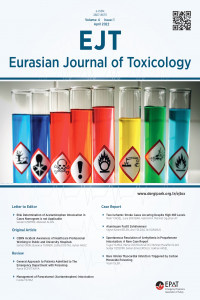Tuğçe YILMAZ, Merve OSOYDAN SATICI, Mehmet Muzaffer İSLAM, Serdar ÖZDEMİR, Serkan Emre EROĞLU, Gökhan AKSEL
Propafenon İntoksikasyonunda Aritminin Spontan Rezolüsyonu: Nadir Bir Olgu Sunumu
Propafenon toksisitesi nadirdir ancak malign aritmiler nedeniyle yaşamı tehdit eden bir tablo
oluşturur. Bununla birlikte, şu anda önerilen bir standart spesifik bir tedavi veya panzehir
bulunmamaktadır. Olgumuzda, özkıyım amacı ile yüksek doz propafenon alımı sonrası geç
başvuruda geçici kardiyak toksitite gözlenen ve spontan iyileşme görülen genç birhastayı sunduk.
Başvuru sırasında elektrokardiyografide PR intervalinin 240 ms ile , QRS genişliğinin 160 ms ile ve
düzeltilmiş QT intervalinin 498 ms ile uzamış olduğu bir sinüs ritmi görüldü; V1 ve aVR;de
terminal R dalgası mevcuttu ve metabolik asidoz gözlendi. Hastanın takibinde sodyum bikarbonat
ve lipid emülsiyon tedavisi planlandı ancak her başvurudan 30 dakika sonra kardiyotoksik aritmi
düzeldiği için uygulanmadı ve destek tedavisi ile metabolik asidozun gerilediği gözlendi. Sonuç
olarak, propofenon intoksikasyonu, diğer sınıf 1C antiaritmikler gibi, yaşamı tehdit eden, nadiren
bildirilen ve klinik kararları zorlaştıran bir toksisitedir. Bu nedenle mortal seyredebileceği bilinmeli,
antidotu olmasa da yakın izlem ve destek tedavi ile tam iyileşme sağlanabileceği unutulmamalıdır.
Anahtar Kelimeler:
aritmi, propafenon, sodyum bikarbonat, intoksikasyon
Spontaneous Resolution Of Arrhythmia in Propafenone Intoxication: A Rare Case Report
Propafenone toxicity is rare but poses a life-threatening condition due to malignant arrhythmias.
However, there is currently no recommended standard specific treatment or antidote. In our case,
we presented a young patient with transient cardiac toxicity and spontaneous recovery in her follow
up after taking high-dose propafenone for suicide attempt. Electrocardiography showed sinus
rhythm with prolongation of PR interval with 240 ms, QRS width 160 ms, and corrected QT
interval QTc with 498 ms; Terminal R wave observed in leads V1 and aVR and metabolic acidosis
was also observed at the time of admission. In patient’s follow up, sodium bicarbonate and lipid
emulsion treatment was planned but did not applied due to the resolution of cardiotoxic arrhythmia
in 30 minutes after her admission, and metabolic acidemia was observed to regress with supportive
treatment. In conclusion, propofenone intoxication, like other class 1C antiarrhythmics, is a life-
threatening, rarely reported toxicity that complicates clinical decisions. It is critical to be aware that
propofenone overdose can be fatal, and is also essential to remember that, despite the lack of an
antidote, total recovery can be accomplished with constant monitoring and supportive treatment.
Keywords:
Propafenone, intoxication, arrhythmia, sodium bicarbonate,
___
- Propafenon. Funck-Brentano C, Kroemer HK, Lee JT, Roden DM. N Engl J Med. 1990; 322 :518–525.
- Saz EU, Ucar SK, Ulger Z, Ersel M, Cevik C, Karapinar B.Successful treatment of suicidal mega dose of propafenone intoxication-a case report. Kardiol Pol 2010;68(11):1284–5.3
- Wozakowska-Kapłon B, Stezpien-Walek A. Propafenone over-dose: cardiac arrest and full recovery. Cardiol J 2010;17(6):619–22.4.
- Bayram B, Dedeoglu E, Hocaoglu N, Gazi E. Propafenone-in-duced cardiac arrest: full recover with insulin, is it possible? Am J Emerg Med 2013;31(2):45.
- Ovaska H, Ludman A, Spencer EP, Wood DM, Jones AL, Dargan PI. Propafenone poisoning--a case report with plasma propafenone concentrations. J Med Toxicol. 2010 Mar;6(1):37-40.
- Clarot F, Goullé JP, Horst M, Vaz E, Lacroix C, Proust B. Fatal propafenone overdoses: case reports and a review of the literature. J Anal Toxicol. 2003 Nov-Dec;27(8):595-9.
- Pentel PR, Fifield J, Salerno DM. Lack of effect of hypertonic sodium bicarbonate onQRS duration in patients taking therapeutic doses of class IC antiarrhythmic drugs, inJ Clin Pharmacol. 1990;789-94
- Yi HY, Lee JY, Lee WS, Sung WY, Seo SW. Comparison of the therapeutic effect between sodium bicarbonate and insulin on acute propafenone toxicity. Am J Emerg Med. 2014 Oct;32(10):1200-7.
- Yayın Aralığı: Yılda 3 Sayı
- Başlangıç: 2019
- Yayıncı: Acil Tıp Uzmanları Derneği
Sayıdaki Diğer Makaleler
Kamu ve Üniversite Hastanelerinde Görev Alan Sağlık Çalışanlarının KBRN Olay Farkındalığı
Serhat ÖRÜN, Büşranur TÜRKERİ, Zeliha DOĞTAŞ, Ayhan AKÖZ
Propafenon İntoksikasyonunda Aritminin Spontan Rezolüsyonu: Nadir Bir Olgu Sunumu
Tuğçe YILMAZ, Merve OSOYDAN SATICI, Mehmet Muzaffer İSLAM, Serdar ÖZDEMİR, Serkan Emre EROĞLU, Gökhan AKSEL
Nomogramın Uygulanamadığı Durumlarda Parasetamol Zehirlenmesi Riskinin Belirlenmesi
Serdar ÖZDEMİR, Abdullah ALGIN
Yüksek INR Düzeylerine Rağmen Görülen İki İskemik İnme Olgusu
Melih YÜKSEL, Suna ERAYBAR, Halil KAYA, Mehmet Oğuzhan AY
Karbonmonoksit Zehirlenmesiyle Tetiklenen Nadir Görülen İnferior Miyokard Enfarktüsü
Acil Servise Zehirlenme ile Başvuran Hastalara Genel Yaklaşım
